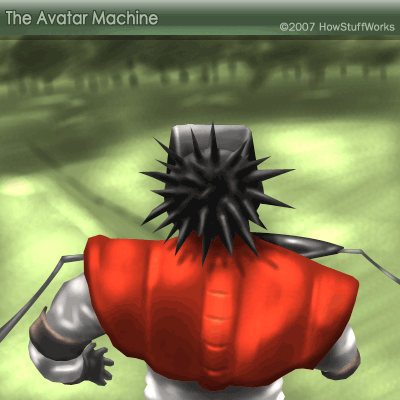Let's get one thing straight before we start: Second Life is not a video game; it's a virtual world. There are people who will become upset if you neglect to make this distinction. And in this virtual world, people lead lives remarkably similar in depth to their "real" lives, or at least to the potential depth they could achieve in real life under different circumstances. A man who is a tax accountant in real life may develop a Second Life character -- an avatar -- who is a 19-year-old female fashion model. And that avatar may earn $100,000 Linden dollars per photo shoot, put $50,000 in a Second Life bank and spend the rest shopping in virtual stores for Manolo Blanhiks, buying virtual art at virtual auctions to decorate her penthouse apartment and handing out bottles of Cristal to everyone in the VIP room in her favorite club. The store, the art auction house, the apartment building, the night club -- these are all run by other avatars. And these avatars are earning money from shoe sales, art sales, rent or co-op fees and cover charges (though no doubt the fashion model gets in free).
As far as virtual worlds go, this is impressive, but it's not revolutionary. What is revolutionary about Second Life is that it's not only legal to make real money from your character's virtual endeavors -- it's encouraged. The exchange of your accumulated Linden dollars into U.S. dollars, Indian rupees or British pounds is built into the system through something called LindeX -- that's where you go to exchange your Linden dough into a form you can deposit in your real-world bank account. Yes -- your actual bank account where your "real-world" paycheck gets direct-deposited every couple of weeks. And it works the other way, too. If your avatar finds itself broke in Second Life, you can charge the U.S. dollar equivalent for a certain number of Linden dollars to your actual, real-life credit card and voila -- you're rolling in virtual cash.
Advertisement
Second Life has basically obliterated the line between virtual commerce and "real world" commerce. People are making real money -- mostly small bucks, but still -- through their activities in Second Life. Their avatars are working as real-estate agents, land developers (this is one of the most lucrative ways to make money in Second Life), bouncers, bar tenders, prostitutes, ad execs and any other occupation that exists in the "real world." Whether you can make serious money in Second Life is debatable and remains to be seen. According to Fortune magazine's David Kirkpatrick, Second Life creator Linden Lab reported that in December 2006, "17,000 [Second Life] residents had positive cash flow in Linden dollars, with about 450 generating monthly income in excess of $1,000" in U.S. dollars. So it doesn't sound like too many people can quit their day jobs yet, but the phenomenon is startling nonetheless: An entire virtual economy that not only mirrors but also ties into the real-world economy has developed to the point that it's hard to tell where one ends and the other begins.
Consider this: An avatar who opens a night club needs employees. That avatar may put out a job search through a Second Life job-finder search engine, looking for cocktail waitresses, bouncers, bar tenders, janitors, and maybe a couple of professional dancers to keep things interesting. The night-club owner pays all of these employees in Linden dollars. Once any avatar collects the Linden dollar equivalent of $150 U.S., he or she or it can exchange the virtual dollars for "real" dollars and deposit them in the bank. The real bank. So is having a job in Second Life all that different from having a job in "real life"? Theoretically speaking, not so much, although the exchange rate of Linden to U.S. is pretty poor: As of January 2007, it's approximately 268 Linden dollars to 1 U.S. dollar. So working in the real world is, at the very least, more profitable. But an interesting new money-making avenue has sprung up in recent months. Companies like IBM -- yes, "real-life" IBM -- are getting involved in Second Life. See the next page to learn more.
Advertisement

